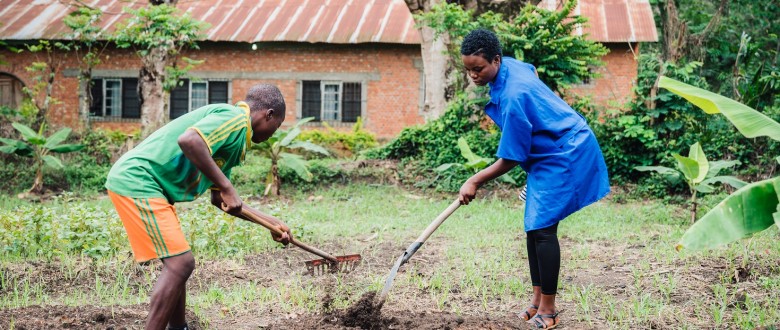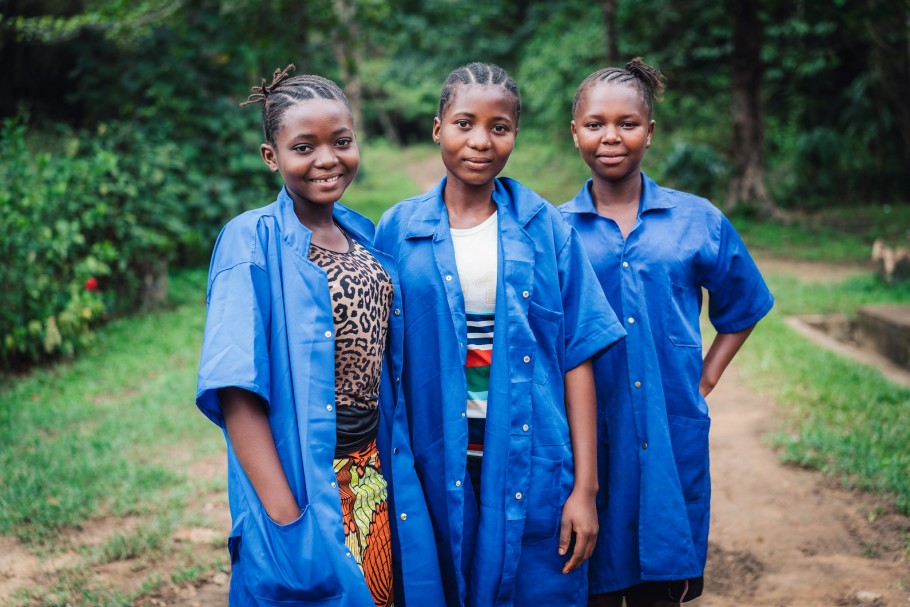
Agriculture in the DR Congo presents ample business opportunities, but a lot remains to be done before we can expect the country’s youthful population to successfully exploit them. Quality entrepreneurship education in secondary agricultural schools is a possible effective path – one VVOB takes together with motivated school leaders and teachers.
Inspiring a generation of agri-entrepreneurs
Agriculture accounts for about 60 per cent of the DRC’s labour activities. Moreover, the country is endowed with a massive amount of available arable land. Many young people, especially those living in rural areas, are engaged in small scale agricultural production. Assisting on the family farm or plot to contribute to household earnings and food security is an important part of many youngsters' lives in the DRC.
But the massive potential lying in both the DRC’s agriculture and its youth offers more. For young people it is important to have diverse sources of income. It makes good sense to combine agricultural production with self-employment. To turn this necessity into an opportunity, VVOB inspires young people to pursue agri-entrepreneurship.
Cross-curricular approach
In the DRC, VVOB zooms in on 3 educational provinces in the west: Bas-Fleuve, Cataractes and Lukaya. The further selection of the 30 secondary technical schools is by no means accidental: the majority are schools that accommodate students of whom many are living in rural areas with a large amount of available arable land. By 2021, VVOB will have improved the quality of entrepreneurship education enjoyed by the 3000 students enrolled in one of the following 4-year course options at the selected schools: general agriculture, agricultural industries, agroforestry, veterinary studies and nutrition.

At this time, each of these options includes a separate course on agri-entrepreneurship. VVOB aims to firmly embed entrepreneurship education in other practical and technical courses as well, choosing an integrated – or in this context a ‘cross-curricular’ – approach to entrepreneurship rather than viewing entrepreneurship as an ‘add-on’ course only. The schools’ own agricultural production units serve as a space for the practical application of this approach.
Production units as pillars for entrepreneurship education
To support the transformation of secondary schools in this regard, VVOB involves the two most important actors for learning outcomes. School leaders and teachers play a central role when it comes to preparing students to be responsible and enterprising individuals and helping them develop an entrepreneurial mindset and skills.
- VVOB embarks on a training and coaching trajectory with school leaders to strengthen the management of their school’s production units. This capacity development includes better and more transparent financial management, effective business planning and valuing the units for pedagogical purposes. School leaders are continuously coached and mentored to put what they learnt into practice, so students can look up to how these role models handle their businesses. Peer exchange is facilitated so school leaders can learn from each other’s missteps and solutions.
- Entrepreneurship education is infused in as many courses as possible with a cross-curricular approach. Teachers of technical and practical courses, as well as teachers of the stand-alone entrepreneurship course, are equally taken on board the development of students’ entrepreneurial competences, each teacher discovering their own specific role in this. Teachers also increasingly apply active and participatory pedagogies using the schools’ production units.
Within a reasonable timeframe, school leaders and teachers turn the schools’ production units into well-run school-based businesses, thanks to proper equipment, good financial management and tools. The involved students are inspired and stimulated to turn their own business ideas into profitable agricultural businesses.
When partners take over
With support from the Belgian government, VVOB has engaged with the relevant ministries of education in the DRC in a longstanding partnership. This programme builds on what we have accomplished in the past, including the introduction of entrepreneurship education in the curriculum for secondary agricultural technical education in the first place, and the co-development of manuals for these courses.
We foster supportive relationships with the provincial inspection services in particular, as they are the identified actors to fully take over VVOB’s role as capacity developers of school leaders and teachers in due time.





